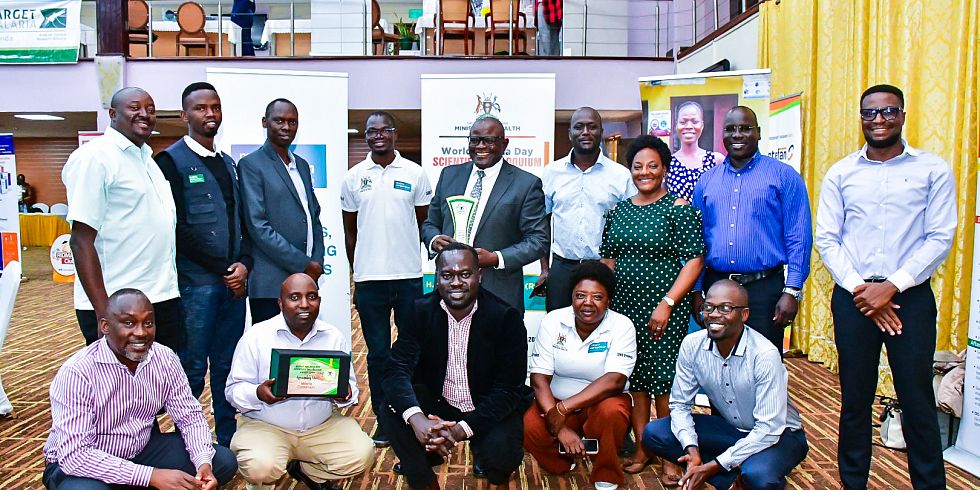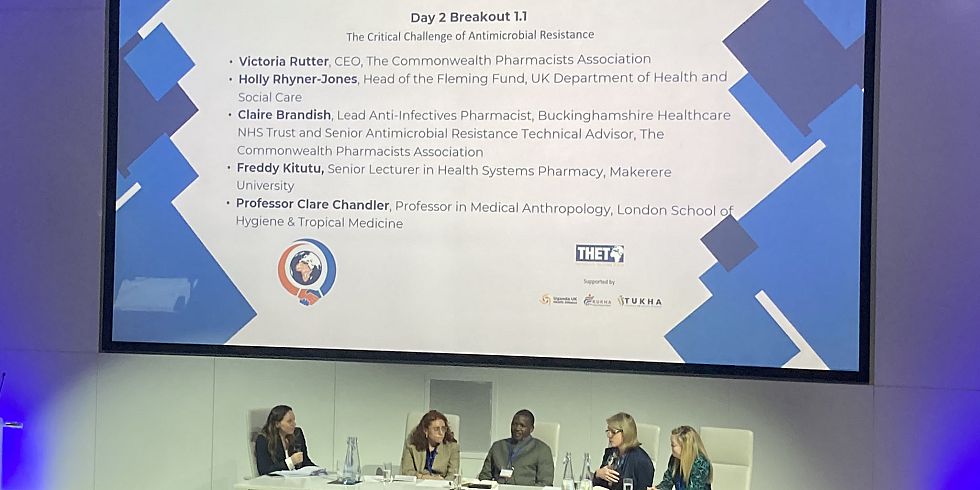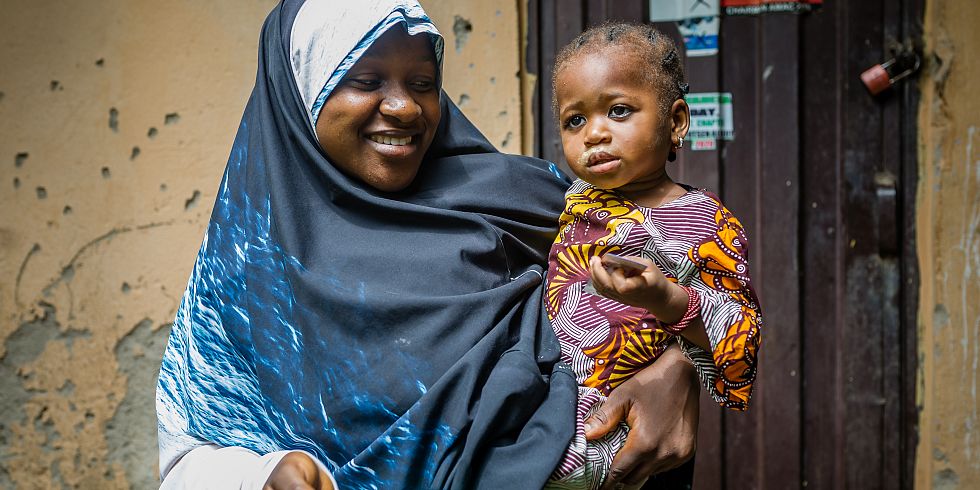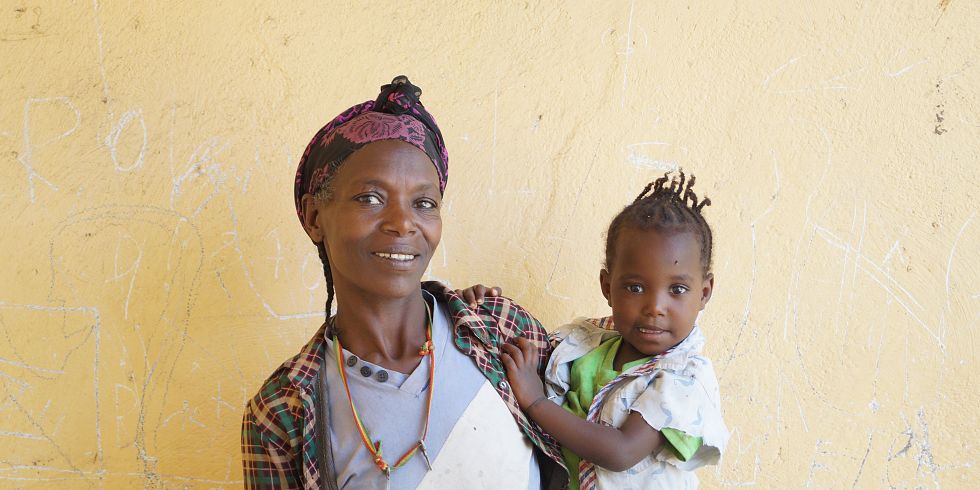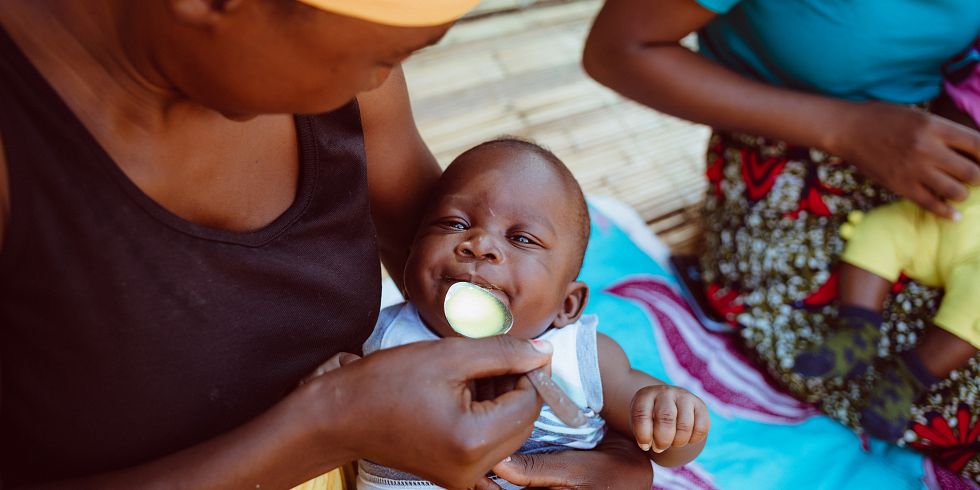Latest News
120 Result(s) found:
Reset all search optionsCurrent search filters ( results match ALL terms):Malaria
Uganda celebrates launch of SMC as part of roadmap to achieve zero malaria status by 2030
26 October 2022Today, Uganda celebrated the official launch of its seasonal malaria chemoprevention (SMC) programme at an event in Moroto, attended by Uganda’s State Minister for Health - General Duties, Anifa Kawooya. In 2023, the governm…
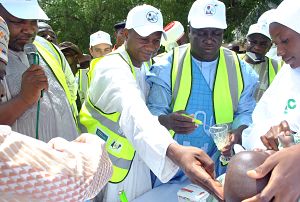
Inauguration ceremony and launch of the Nigeria End Malaria Council
16 August 2022Today in Nigeria, the inauguration and launch of the Nigeria End Malaria Council (NEMC) – a public-private partnership formed to support the National Malaria Elimination Programme (NMEP) in achieving its goal of ending malar…

Annual SMERG meeting drives digitalisation of malaria surveillance
20 May 2022The RBM Partnership to End Malaria hosted its 33rd meeting of the Surveillance, Monitoring, and Evaluation Reference Group (SMERG) from 17 to 20 May 2022 in Kigali, Rwanda. Discussions focused on ways to streamline surveillan…
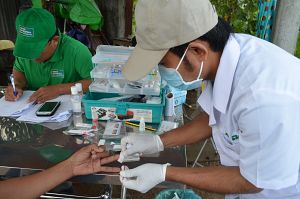
Virtual Microbiology and Infectious Disease Summit 2022 explores malaria diagnostics
18 May 2022Yesterday, the Virtual Microbiology and Infectious Disease Summit 2022 hosted a selection of world-leading health experts in microbiology and infectious disease, presenting on a range of cutting-edge public health topics via live …
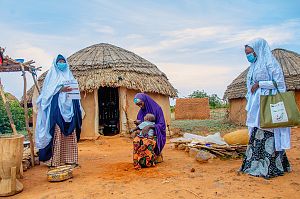
Exciting potential for increased protection against malaria for young children in combining malaria vaccine with seasonal malaria chemoprevention
27 August 2021A seminal paper, published on 25 August in the New England Journal of Medicine, details results from a three-year trial to test the efficacy of the RTS,S/AS01 E malaria vaccine in combi…
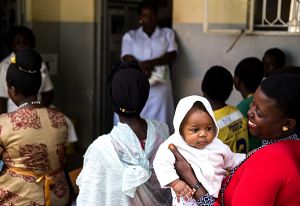
Celebrating success: huge wins in reducing malaria cases and deaths in Uganda as USAID-funded project comes to a close
17 August 2021Malaria Consortium is today celebrating the successful close of the United States Government (USG)-funded Malaria Action Program for Districts (MAPD), having achieved impressive results in improving the health status of the Uganda…
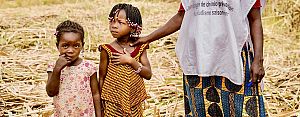
Continuing the fight to shrink the malaria map in the Sahel
24 July 2018Another rainy season brings malaria preventive treatment to children
July 2018 marks the fourth year Malaria Consortium will provide preventive treatments to children under five to protect them from malaria during the rainy seaso…
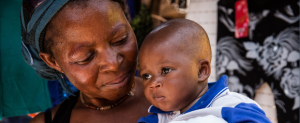
Countries need to prioritize anti-malaria efforts like SMC. Here’s why.
20 February 2018On November 17th, 2017, Chad was the last country to complete the 2017 SMC round. This marked the last ‘implementation’ day of the ACCESS-SMC project, which is scheduled to end on February 28th, 2018. Through ACCESS-SM…

Experts discuss extending access to quality health services in low income countries
21 November 2017For many marginalised and vulnerable populations, access to quality healthcare remains out of reach, despite overall global health progress. “There are 400 million people worldwide who do not have access,” said…
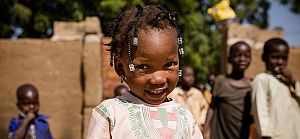
Al Jazeera Interview: James Tibenderana warns of consequences on malaria burden if funding is not secured in time
15 November 2017In this interview, Al Jazeera’s Julie McDonald speaks with Malaria Consortium’s Technical Director James Tibenderana on how seasonal malaria chemoprevention (SMC) is an effective method to prevent malaria in children…

Targeting malaria hotspots in Cambodia by strengthening infrastructure
23 October 2017A new malaria post, designed to facilitate ongoing efforts to diagnose and treat malaria in hard-to-reach areas, has been established in Preah Vihear, Cambodia - a high transmission risk area along the border with Thailand.
The r…
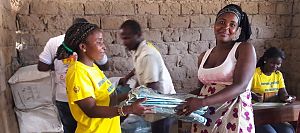
Malaria Consortium to provide vector control expertise in a new multi-country project
20 October 2017Malaria Consortium is pleased to be part of a major project, called PMI VectorLink, led by Abt Associates that has been awarded by the United States Agency for International Development (USAID) through the U.S. President&rsqu…
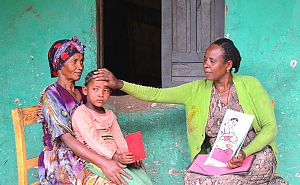
Investing in Social and Behaviour Change Communication (SBCC) in the fight against malaria
17 August 2017For people living in Ethiopia, where malaria is endemic, long-lasting insecticidal nets (LLINs) are an important tool for preventing malaria. LLINs, like diagnosis and treatment for malaria in public health facilities, are provide…
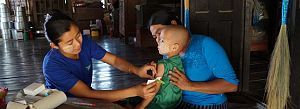
Remote, rural populations in Myanmar receive improved healthcare
4 August 2017Malaria Consortium announced the results from its project introducing integrated community case management (iCCM), which includes diagnosis and treatment of malaria, diarrhoea, pneumonia and malnutrition at a dissemination event t…
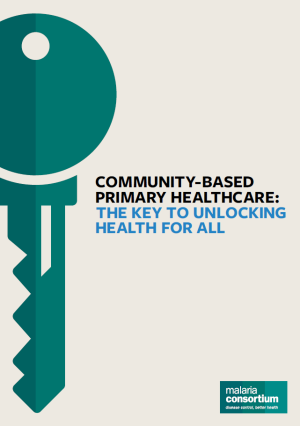
Community-based Primary Healthcare: the key to unlocking health for all
2 August 2017Community-based primary healthcare has potential for delivering health services to hard-to-reach and under-served communities, and for achieving the Global Goals on health, says a new report published by Malaria Consortium
Despit…
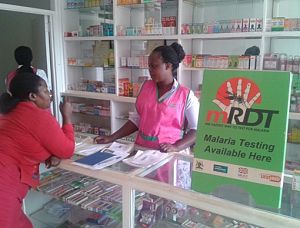
African Excellence Award recognises expertise in project communications
29 June 2017We are delighted to announce that Malaria Consortium Uganda has received an award at this year’s African Excellence Awards.
The African Excellence Awards were set up to acknowledge ‘the most outstanding achievements o…
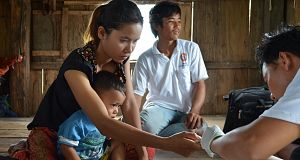
Building a malaria information system in Cambodia for elimination
27 June 2017Background
Malaria Consortium technical experts led the submission of a recently published peer-reviewed article on malaria surveillance strengthening in Cambodia through an upgraded web-based malaria information system (MIS).
T…
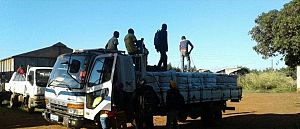
Four million nets distributed in Mozambique
13 June 2017Malaria Consortium has successfully completed a mass distribution campaign of over four million long-lasting insecticidal nets (LLINs) across Nampula and Niassa provinces in Mozambique. The nets were distributed almost simul…

Malaria Consortium seals partnership with Myanmar Government
19 May 2017Malaria Consortium has officially signed a new Memorandum of Understanding with the Department of Public Health and Ministry of Health and Sports Myanmar, paving the way for future collaboration and project implementation.
The ag…
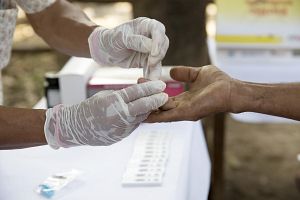
World Malaria Day 2017: We're half way there
25 April 2017Today marks the 11th annual World Malaria Day and an opportunity to consider the progress made reducing the malaria burden.
It is a well acknowledged fact that malaria reduction represents one of the most successful achievements …

Survey helps to inform Thailand’s malaria elimination strategy
10 March 2017From May to August 2016 Malaria Consortium conducted an endline survey designed to evaluate the coverage and use of malaria preventive interventions and case management practices among those living in malaria endemic regions in Th…

Malaria Consortium trustee, Professor Sir Brian Greenwood, on drug resistance
1 March 2017Malaria Consortium trustee, Professor Sir Brian Greenwood, talks to meta-charity, GiveWell, on the potential resistance of antimalarial drugs currently used for seasonal malaria chemoprevention
The discussion highlights the unce…

Malaria Consortium Mozambique wins award for highly effective net distribution pilot
23 February 2017In February 2017, Malaria Consortium was invited to the Alliance for Malaria Prevention’s (AMP) annual partners meeting in Geneva to share lessons learnt from a net distribution pilot project in Mozambique. The pilot impleme…

Malaria Consortium presents at 2017 MalEND Keystone Symposia meeting
21 February 2017Two Malaria Consortium technical experts will present on two key aspects of the organisation’s research at the 2017 Malaria: From Innovation to Eradication (MalERA) conference, co-organised by Keystone Symposia and Mal…
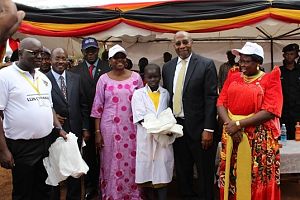
Uganda launches record net campaign to fight malaria
17 February 2017Apac district, Uganda - A campaign to distribute 24 million long lasting insecticide-treated nets (LLINs) across Uganda was officially launched in a ceremony held today in the Apac district, in the Northern Region of the coun…

Why the Government must commit to eliminating malaria (Politics Home)
17 February 2017This article was originally published on Politics Home
Malaria Consortium’s Global Technical Director Dr James Tibenderana speaks to PoliticsHome about the challenges we face in the fight against infectious diseases.
Comba…

There is no room for complacency in the battle against malaria – DfID Secretary (Politics Home)
19 December 2016This article was originally published on Politics home.
A group of experts met last week to launch a report from the World Health Organisation and to talk about how best to stamp out the disease.
2016 has been a “tr…

World Malaria Report highlights successes but calls for further funding
13 December 2016The World Health Organization’s (WHO) World Malaria Report 2016 highlights that there has been a significant improvement in access to effective malaria-fighting interventions. However, gaps in coverage remain in high ma…
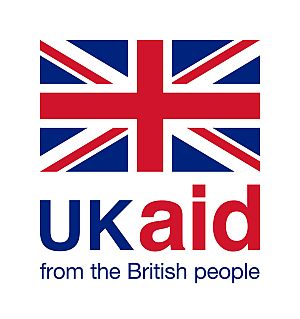
Aid reviews demonstrate UK’s continuing leadership in international development
7 December 2016Malaria Consortium welcomes the newly published Bilateral and Multilateral Development Reviews from the Department for International Development (DFID), which recognise the incredible impact UK aid has made around the world.
The …

Malaria Consortium placed as a GiveWell top charity
29 November 2016Today, Malaria Consortium is delighted to be positioned as a GiveWell top recommended charity.
GiveWell is a world-renowned meta-NGO that recommends charities by assessing them on four criteria: effectiveness, cost-effectiv…
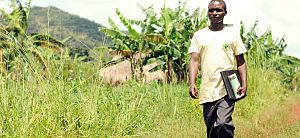
Help us improve access to healthcare in eastern Uganda
23 September 2016[{dx-module-home_justgiving}] When your child is sick from a fever, vomiting or suffering from dehydration from constant diarrhoea, you need to seek urgent medical help. If you live in a rural area with no transport, you need that…

Malaria Consortium welcomes UK’s increased Global Fund commitment
19 September 2016Donors met at the fifth replenishment conference of The Global Fund to Fight AIDS, Tuberculosis and Malaria on 16-17 September in Montreal, Canada to pledge US$12.9 billion to fight the three targeted diseases. This historic finan…

Creating community dialogue to combat malaria
29 July 2016Malaria is one of the most significant health threats in Ethiopia where, in spite of available preventive measures, many people remain unsure of the ways to protect themselves from the threat of this disease. Thanks to Malaria Con…
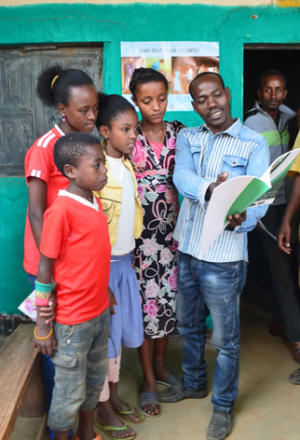
School children spread the word about malaria prevention
29 July 2016Malaria is one of the leading causes of sickness and death for children under five in Ethiopia, with the disease particularly prevalent in the Southern Nations, Nationalities and Peoples Region (SNNPR). In this region, in spi…

Solar powered mini-media kits support malaria prevention in Ethiopian communities
29 July 2016During a recent visit to the Southern Nations, Nationalities, and Peoples' Region (SNNPR), Ethiopia, Malaria Consortium teams visited the Meja Primary School to hear how our awareness raising project has improved both health seeki…
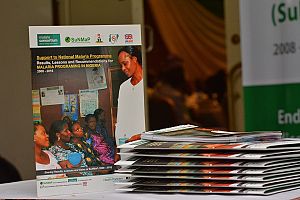
Parliamentary report acknowledges success of Malaria Consortium’s SuNMaP Nigeria programme
28 July 2016Malaria Consortium welcomes the findings of a new report by the UK Parliament’s International Development Committee (IDC) into the effectiveness of the UK Department for International Development’s (DFID) programmes in…
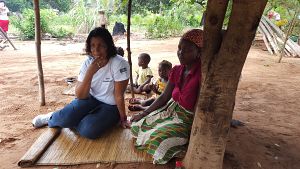
Photo story: bringing healthcare to under-fives in rural Mozambique
7 July 2016Mozambique still faces major challenges in reducing maternal and child morbidity and mortality, despite making significant progress over the past decade. Because so many children live beyond the periphery of the health system, pri…
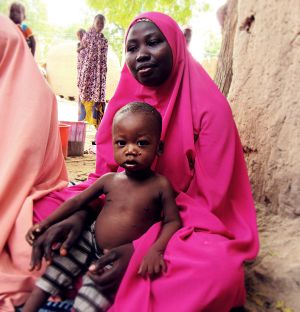
Video series on Malaria Consortium-led project in the Sahel
4 July 2016Malaria Consortium is the lead partner of the Achieving catalytic expansion of seasonal malaria chemoprevention in the Sahel (ACCESS-SMC) project, which supports National Malaria Control Programmes in the Sahel regi…
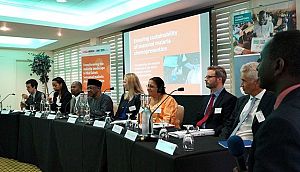
Symposium on innovative malaria prevention method held in London
1 July 2016On 9th June, Malaria Consortium ran a symposium in London entitled Transforming the malaria landscape in the Sahel: Seasonal malaria chemoprevention.
In the Sahel region of sub-Saharan Africa, the risk of malaria increases w…

Health systems strengthening critical to tackle 'seemingly endless' global health emergencies (Politics Home)
16 June 2016This article was originally published on Politics Home.
Strong health systems are critical to international efforts to tackle emerging health emergencies, such as Ebola and Zika.
Global health emergencies have barely been out o…
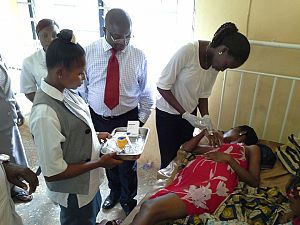
Success treating severe malaria in Nigeria
15 June 2016Abuja, Nigeria – “Mortality rates in those states where we ran our severe malaria project fell from 25 to just one percent. These results are, in part, due to the project and show that the use of injectable artesunate …

VIDEO: How to defeat one of the world’s oldest and deadliest diseases (Politics Home)
24 May 2016This article was originally published on Politics home.
"We need a scaling up of domestic and international resources" to end malaria, says Malaria Consortium.
Fifteen years ago, malaria killed a child every 30 seconds. Un…

World Malaria Day around the world – in pictures
3 May 2016This year’s World Malaria Day, held on April 25th, saw Malaria Consortium engage in a diverse range of activities in many of our countries. The commemorative day, which was established by the United Nations in 2007, provides…
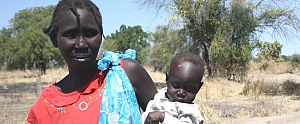
Linking nutrition to the treatment of children with malaria, pneumonia and diarrhoea
25 April 2016In South Sudan, Malaria Consortium saves lives by preventing and treating malaria, pneumonia, diarrhoea and undernutrition
The approach
Since 2009, Malaria Consortium has been implementing a programme for the integrated communi…
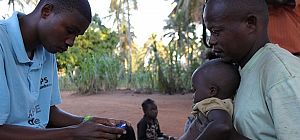
Innovation key to defeating malaria
25 April 2016London, 25 April 2016 – “Significant progress in malaria control and elimination has been made between 2000 and now, with malaria mortality rates falling by 60 percent and over 6.2 million lives saved since 2000. This …

UK’s commitment to malaria should put disease surveillance at its core (Politics Home)
25 April 2016This article was originally published on Politics Home.
As we mark World Malaria Day on the 25 April, Malaria Consortium calls on the UK to place strengthening disease surveillance systems to find and treat every malaria case at…
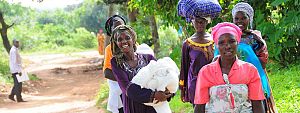
Unprecedented net gains: the role of insecticidal treated nets in fighting malaria
22 April 2016Extending access, and increasing use, of mosquito nets amongst those most at risk from malaria – pregnant women and children under the age of five – has been a significant factor contributing to a massive decrease in m…
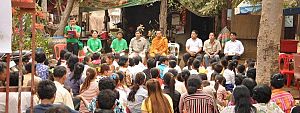
Positive deviance approach helps reduce malaria cases in Asia
14 March 2016Malaria Consortium has recently published a paper in Malaria Journal which describes our experiences carrying out an innovative approach to malaria control in Cambodia. Originally used to improve nutrition outcomes in the 1970s, &…

Strong regional health systems are the answer to infectious disease control
9 March 2016Bangkok, 9 March 2016 – “Every day we see evidence of the impact of infectious diseases, not only on our health systems, but on our economy and most importantly the everyday life of our people.”
Dr. Amnuay Gajee…
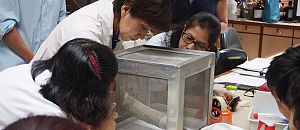
Community level personal protection crucial for malaria elimination in Myanmar
3 March 2016Yangon, Myanmar - “Scaling up insecticide-treated clothing and targeting migrant and mobile populations in Myanmar is crucial. Treated clothing partly fills a gap in personal protection of vulnerable populations who are expo…

Insecticide-treated nets might still prevent malaria despite mosquito resistance
26 February 2016Insecticide-treated mosquito nets have contributed to the prevention of millions of deaths due to malaria.
In recent years, there has been growing concern that mosquitoes are becoming resistant to the pyrethroid insecticides used…

Unique Interactive Malaria Guide for the private sector in Asia
22 February 2016Malaria Consortium, together with Montrose, has developed an interactive online malaria guide for the private sector in the Asia-Pacific region. This guide will help companies manage the detrimental effects – both human and …
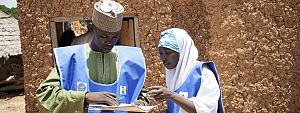
Eight-year programme contributes to significant malaria decrease in Nigeria
18 February 2016Abuja, 18 February 2016 - “I am inspired by the efforts of SuNMaP and its partners. There is no question that SuNMaP has had a huge impact upon malaria in Nigeria.”
Dr Ngozi Azodoh, Assistant Director - MDGs and Resou…
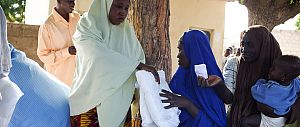
Support to National Malaria Programme ends with dissemination event
17 February 2016Abuja, 16 February 2016 - SuNMaP, the Support to National Malaria Programme, has come to an end after eight years of working to improve Nigeria’s health system. Today – on the first of a two-day event in Abuja, Nigeria…
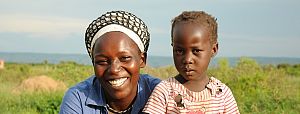
Malaria Consortium welcomes five-year £3 billion commitment to fight malaria
25 January 2016London, UK - “Malaria Consortium welcomes the recommitment from the UK Government to spend £500m a year to fight malaria,” said Chief Executive, Charles Nelson, following the announcement today by the UK Cha…

Donors urged to follow UK's lead as Osborne pledges £3 billion to fight malaria (Politics Home)
25 January 2016This article was originally published on Politics Home.
Malaria Consortium welcomes five-year £3 billion commitment to fight malaria and calls for other countries to follow the UK's lead.
“Malaria Consortium wel…
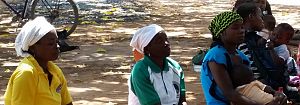
COMDIS-HSD annual review highlights 2015 achievements
19 January 2016COMDIS-HSD, a Research Programme Consortium (RPC), which conducts operational research to improve health service delivery for underserved populations, released its annual review today. The review highlights the RPC’s achieve…

Health for all: putting the last mile first
10 December 2015Universal health coverage (UHC) means that every person, everywhere, has access to quality health services without suffering financial hardship.
As we celebrate universal health coverage day and advocate for health services to be…
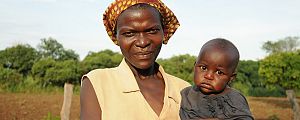
Panel call for sustained investment to build on malaria success of the past 15 years
9 December 2015London, 9 December 2015 - “The shortfall in malaria investment is daunting. It is important we find the right balance between funding countries with the highest burden, and those aspiring for malaria elimination.”
Dr …

VIDEO: Filling the gap with community health workers (Politics Home)
9 December 2015This article was originally published on Politics home.
What is the role of policy makers in filling the global healthcare shortage?
There is a global shortage of 7.2 million health workers worldwide – and this…

Malaria Consortium presents at the 2015 Joint International Tropical Medicine Meeting
3 December 2015Malaria Consortium staff are presenting at the Joint International Tropical Medicine Meeting 2015 (JITMM 2015) from December 2-4. The annual conference, held in Bangkok, Thailand, brings together researchers, policymakers, practit…
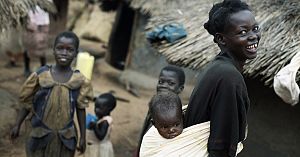
UK anounces new malaria fund in advance of spending review
24 November 2015Malaria Consortium has welcomed the UK’s announcement of a new £1 billion fund which will be used to support the global fight against malaria and other infectious diseases. However, in order to see an end to this deadl…

UK announce new malaria fund in advance of Spending Review (Politics Home)
24 November 2015This article was originally published on Politics Home.
Malaria Consortium welcomes yesterday's announcement by Chancellor George Osborne and Bill Gates that they are to join forces as part of the global effort to end m…
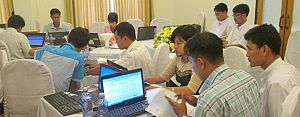
Training for improved surveillance and data management in Myanmar
13 November 2015Last month, Malaria Consortium – in partnership with the National Malaria Control Programme (NMCP), the World Health Organization (WHO) and the Centers for Disease Control and Prevention/President’s Malaria Initiative …

Dramatic drop in malaria cases in northern Nigerian state of Katsina
12 November 2015Abuja, Nigeria, 12 November 2015 – Following the first ever seasonal malaria chemoprevention (SMC) distribution programme in areas of Katsina state, northern Nigeria, reported malaria cases in children under five dropped by …
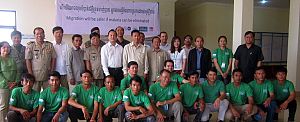
Measuring malaria among border-crossers in Southeast Asia
5 November 2015In September, Malaria Consortium launched the second phase of its cross-border project in Stung Treng province, Cambodia. This new study will build on the work of a project that ended last year, which investigated the impact of mo…

All fever does not equal malaria - a Q&A on the importance of diagnosis
28 October 2015To mark the launch of a new series of advocacy briefs, the first of which is on the topic of malaria diagnostics, Malaria Consortium’s Senior Public Health Diagnostics Specialist, Elizabeth Streat, discusses why the universa…

Malaria Consortium urges new UK malaria and NTD commitment
27 October 2015Following a parliamentary debate on the UK’s work tackling malaria and neglected tropical diseases, Malaria Consortium calls on the UK Government to make a strong commitment to defeat these devastating diseases
Great progre…

Funding to combat malaria must be sustained or risk threat to progress (Politics Home)
27 October 2015This article was originally published on Politics Home.
Malaria Consortium backs Jeremy Lefroy MPs call for the Government to maintain funding commitments to combat malaria and neglected tropical diseases, warning that the thre…

Malaria Consortium presents at the 2015 ASTMH Annual Meeting in Philadelphia
26 October 2015This week, Malaria Consortium is presenting at the 64th annual meeting of American Society of Tropical Medicine & Hygiene (ASTMH) in Philadelphia. Our symposiums and interactive presentations will cover a number of topics rang…
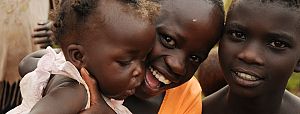
The Sustainable Development Goals provide an opportunity for UK to prioritise global health (Politics Home)
25 September 2015This article was originally published on Politics Home.
As the UN General Assembly meets to adopt the Sustainable Development Goals (SDGs), Malaria Consortium Chief Executive Charles Nelson calls upon the UK to work to its stren…
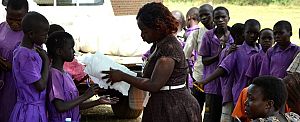
BBC interviews Dr James Tibenderana on progress against malaria MDG target
21 September 2015Following the release of findings in the Journal Nature yesterday highlighting the effect of malaria control on Plasmodium falciparum in Africa, between 2000 and 2015, the BBC World Service interviewed Malaria Consortium Developme…

New UNICEF and WHO report shows MDG target for malaria met
18 September 2015“We already have the tools available to prevent anyone dying from malaria and evidence shows that the global commitment to defeat this disease has made a significant impact.” Charles Nelson, Malaria Consortium Chief Ex…

VIDEO: Urgent political support needed to protect the Sahel's 25 million children (Politics Home)
16 September 2015This article was originally published on Politics Home.
The organisation calls for urgent political and financial support of seasonal malaria chemoprevention to protect children from malaria 'when they are most at risk.'
…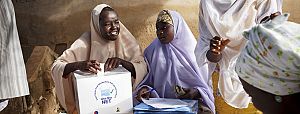
Malaria Consortium's support to planning and capacity building in Nigeria acknowledged at Annual Performance Review
3 September 2015During August, an evaluation team from the UK Department for International Development (DfID) met with stakeholders and partners in Nigeria as part of its annual programme review of ‘Support to National Malaria Programme in …
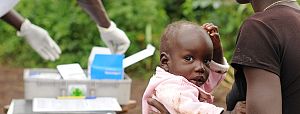
Uganda sees huge scale-up of intervention targeting three main childhood diseases
25 August 2015Sheema, Uganda, 25 August 2015 – Today, the Ugandan President Gen. Yoweri Kaguta Museveni launched a new Integrated Community Case Management (iCCM) programme funded by the Global Fund to Fight AIDS, Tuberculosis and Malaria…
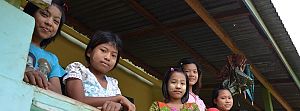
First Malaria Indicator Survey in Myanmar kicks off in Yangon
10 August 2015Early August saw the start of the first nationwide malaria survey of its kind in Myanmar, where the spread of drug resistance to antimalarial drugs is a growing obstacle to the elimination of the disease. The Malaria Indicator Sur…

Great majority of populations with access to nets use them for the intended purpose (Politics Home)
24 July 2015This article was originally published on Politics Home.
Malaria Consortium was disappointed to read the criticism of the Global Fund to fight HIV/AIDS, Tuberculosis and Malaria in The Times and Daily Mail today.
The Globa…
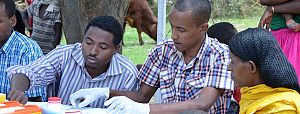
Beyond Garki baseline results released, highlighting changes in malaria environment
11 June 2015Over the last 15 years, increased global investment in fighting malaria has contributed substantially to reduction in the prevalence of the disease in endemic countries around the world. With the development of new technologies an…
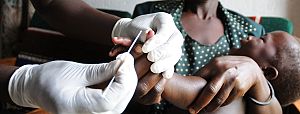
Governments and partners in Africa discuss moving towards malaria elimination
10 June 2015Maputo, 10 June
“We must acknowledge that prioritising between competing elements is not easy and it is only through confidence in timely evidence, driving a stratified response, with cooperation across borders, supported b…

UK 'must continue to lead the fight against malaria' (Politics Home)
24 May 2015This article was originally published on Politics Home.
Ahead of World Malaria Day 2015, Malaria Consortium urges the next government to remain committed to defeating this deadly disease.
Each year, World Malaria Day serves as a…
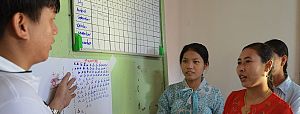
Malaria Consortium conducting Myanmar's first Malaria Indicator Survey
22 May 2015In partnership with the National Malaria Control Programme (NMCP), and with funding support from the President’s Malaria Initiative, the US Centers for Disease Control and Prevention, and the Three Millennium Development Goa…

Malaria Consortium supports new malaria strategies
20 May 2015The 28th Roll Back Malaria Partnership (RBM) board meeting, held on the eve of the World Health Assembly, used the opportunity to endorse the Action and Investment to Defeat Malaria 2016-2030 (AIM), which complements the World Hea…

World Malaria Day around the world - in pictures
30 April 2015World Malaria Day is an international event that brings people together from around the globe to unite in the fight against malaria. Malaria Consortium has offices in Africa and Asia which commemorate April 25th by holding a varie…
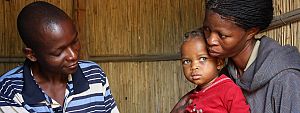
World Malaria Day 2015: more funds needed at crucial moment in development history
24 April 2015“This World Malaria Day, we call for efforts to rid the world of malaria to be stepped up, focusing first on ending all deaths from malaria. This can be done very effectively with the tools we have already, but this will onl…

New animation highlights the threat of drug resistant malaria (Politics Home)
24 April 2015This article was originally published on Politics Home.
Malaria Consortium are proud to announce the launch of the first in a new series of short advocacy animations relating to areas of our work.
The spread of drug resis…
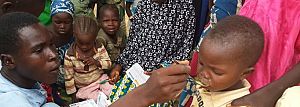
Nearly 800,000 children to receive malaria protection in Northern Nigeria
23 April 2015New project prepares to provide seasonal malaria protection in Zamfara and Sokoto
(Nigeria) As World Malaria Day 2015 approaches (25th April), a new project in Nigeria prepares for the distribution of preventive malarial treatmen…
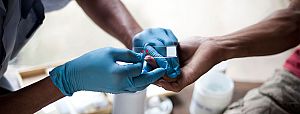
Panel call for EU to address the urgent threat of drug resistant malaria
20 April 2015“The issue of drug resistant malaria in the Greater Mekong Subregion is an urgent one. We need to see every case as an emergency and to act quickly. Our most effective drugs are under threat and the only way to address this …
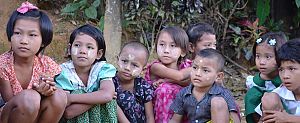
Malaria Consortium to host debate on EU response to global threat of malaria drug resistance
14 April 2015On the occasion of World Malaria Day 2015 (commemorated annually on 25 April), Malaria Consortium, in partnership with the Roll Back Malaria Partnership and PATH Malaria Vaccine Initiative, will be hosting a panel discussion in Br…

The people behind Operation Health
8 April 2015Operation Health – Comic Relief’s initiative to refurbish a health facility with support from Malaria Consortium – has had widespread participation from the local community in Iyolwa, eastern Uganda. Check o…

Malaria Consortium's 'Stop Malaria Project' ends with close-out event
24 March 2015This month marked the completion of the Stop Malaria Project, which had been running across Uganda for six years.
Funded by USAID/President’s Malaria Initiative (PMI) and led by Johns Hopkins University Center for Communica…
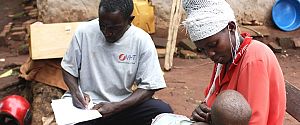
New Malaria Consortium project will expand access to iCCM services across mid-western Uganda
16 March 2015Malaria Consortium is pleased to announce that Comic Relief has awarded us a grant to run a new project in midwestern Uganda focusing on reducing deaths from pneumonia, diarrhoea and malaria in children under five, as well as…
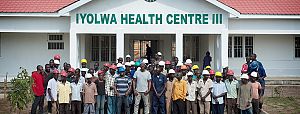
Red Nose Day 2015 marks the culmination of Operation Health project
13 March 2015London. Friday, March 13 – Today is Red Nose Day, marking the culmination of Comic Relief’s Operation Health project in Uganda. The project, which began nine weeks ago, saw the reconstruction and renovation of a dilapi…
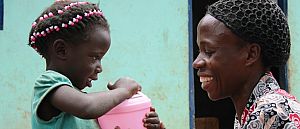
Ugandan Pioneer Project unveils achievements and charts the way forward
26 February 201525 February – With 100 percent of its population at risk of malaria and 15,632 deaths from malaria occurring last year, Uganda faces many challenges. Chief among these are high malaria transmission, key health system challen…

Pioneer Project - in pictures
25 February 2015Malaria Consortium’s Pioneer project was a five-year initiative in Uganda that reduced the malaria burden in the country using a variety of effective methods. Take a look at the gallery below to learn more about t…
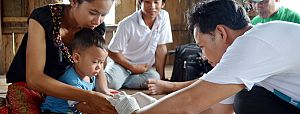
Malaria: the last mile - a special report on drug resistant malaria
30 January 2015The spread of drug resistant malaria threatens to undermine the excellent progress made in recent years to tackle this disease. This is an issue of international importance as if drug resistant malaria spreads to Africa the impact…
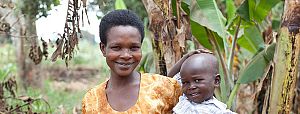
Malaria Consortium supports Comic Relief's Operation Health campaign
29 January 2015Malaria Consortium is delighted to be part of Comic Relief’s main fundraising campaign for Red Nose Day this year - Operation Health, involving a major renovation of a dilapidated rural clinic in Uganda.
International healt…

The Road to Dignity - Malaria Consortium's response
7 January 2015Malaria Consortium welcomes the UN Secretary General’s synthesis report as an important contribution to the post-2015 negotiation process. It is crucial that the Sustainable Development Goals (SDGs) both continue with the un…

New paper highlights the role of the commercial sector in net coverage
16 December 2014Malaria Consortium is pleased to release a new Learning Paper on developing a long lasting insecticidal net retail (LLIN) market in Nigeria, highlighting how the commercial sector can help to expand the coverage of nets in Nigeria…

Drug-Resistant Malaria: Elimination is the Answer (Politics Home)
11 December 2014This article was originally published on Politics Home.
With drug-resistant malaria spreading in Southeast Asia, Malaria Consortium calls for the international community to accelerate efforts to eliminate the disease.
Progress i…
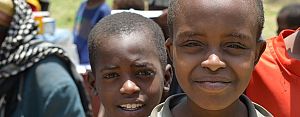
Scale-up of effective malaria control dramatically reduces deaths
9 December 2014The World Malaria Report 2014 shares the good news, but warns the fight is far from over
The World Malaria Report 2014, released today by the World Health Organization, was launched in the UK Parliament in the presence of the Duk…
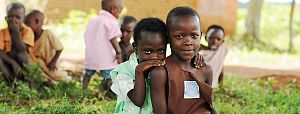
Report shows impressive progress in reducing malaria cases and deaths
9 December 2014(London) Malaria Consortium welcomes the release of the World Health Organization’s 2014 World Malaria Report today and the encouraging news it delivers on the progress made toward reaching global targets to control and elim…

Report shows impressive progress in reducing malaria cases and deaths (Politics Home)
9 December 2014This article was originally published on Politics Home.
(London) Malaria Consortium welcomes the release of the World Health Organizations 2014 World Malaria Report today and the encouraging news it delivers on the progress ma…

Malaria Consortium at the Joint International Tropical Medicine Meeting 2014
4 December 2014Malaria Consortium gave a number of presentations at the Joint International Tropical Medicine Meeting (JITMM 2014) and the 8th seminar on Food- and Water-borne Parasitic Zoonoses (FBPZ8) in Bangkok from December 2-4.
This year&r…
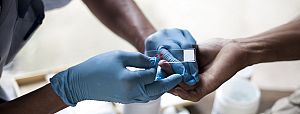
Malaria Consortium promotes knowledge sharing in its efforts to eliminate malaria
25 November 2014Malaria Consortium is pleased to announce that we have shared our research portfolio on the newly launched MESA Track database.
Malaria Eradication Scientific Alliance (MESA), with whom Malaria Consortium is a collaborating partn…
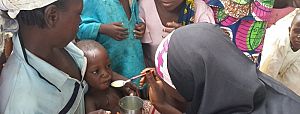
Seasonal malaria chemoprevention project officially kicks off
17 November 2014ACCESS-SMC, a UNITAID-funded project, led by Malaria Consortium in partnership with Catholic Relief Services, was officially launched at a meeting in Uganda last month. It is supporting National Malaria Control Programmes across t…

Bill Gates commits to eradicating malaria in his lifetime
3 November 2014In the opening keynote speech of the annual meeting of the American Society of Tropical Medicine and Hygiene, Bill Gates called upon the international community to drive towards eradicating malaria in this generation, calling…

Malaria Consortium at ASTMH
28 October 2014Malaria Consortium at the American Society of Tropical Medicine and Hygiene meeting in New Orleans, November 3 - 6
Malaria Consortium will be giving a number of presentations at the 63rd annual American Society of Tropical Medici…
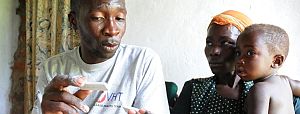
Delivering health services to children through integrated community case management in Uganda
23 October 2014Malaria Consortium is pleased to announce that Agnes Nanyonjo, Research Officer in our Uganda office, has completed her doctoral thesis on 'Delivering health services to children through integrated community case management in Uga…

Malaria report announces new era in fighting the disease
14 October 2014London, 14 October - We are at a tipping point in the fight against malaria and the UK government must renew its commitment to beat this preventable and treatable disease.
According to a new report, Malaria in 2014: An Unpreceden…

Malaria Consortium presents at the Third Global Symposium on Health Systems
3 October 2014Malaria Consortium was well represented at this week’s Third Global Symposium on Health Systems Research in Cape Town, which ran from 30 September until 3 October 2014. The conference was attended by 1,700 researchers,…
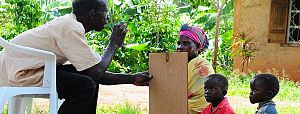
InSCALE: Advocating for increased iCCM coverage in Uganda
23 September 2014Three quarters of deaths in children under five are caused by malaria, diarrhoea and pneumonia often because access to quality health care is hardest in areas where the need is greatest. Uganda has one of the highest infant mortal…

Fake medicines and malaria
18 September 2014In 2012, the World Health Organization (WHO) estimated that there were 207 million cases of malaria, which killed approximately 627,000 people – mostly children in sub-Saharan Africa.
The best weapon for treating malaria is…
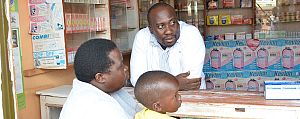
Uganda launches test kits project to boost malaria treatment in private health sector
16 September 201416 September - Malaria Consortium, in partnership with the Ministry of Health and the National Drug Authority, WHO and other NGOs, has launched a $6.2 million (about £10.1 million) project to create a private sector market f…

Community dialogues in Zambia - in pictures
2 September 2014The success of health interventions hinges on the involvement of affected communities. One method of encouraging engagement is through community dialogues, which gather villagers to discuss and find local solutions to health chall…
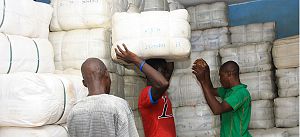
Harmonisation: lessons for improving donor and partner support for malaria control
22 August 2014For most large-scale health programmes, harmonisation amongst partners is key. When it comes to disease control, this is all the more essential. As organisations work with limited resources and across multiple countries, they have…
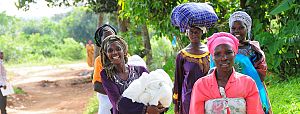
Historic campaign delivers mosquito nets to every household across Uganda
18 August 2014A universal LLIN campaign to distribute 21 million nets across Uganda reached completion this weekend and was marked at an event in Kampala.
The first distribution of its kind in Uganda, the 16 month campaign represents a signifi…

Orientation on external quality assurance for malaria diagnostics
12 August 2014The Ugandan Ministry of Health, through funding from the Global Fund to Fight AIDS, Tuberculosis and Malaria, is rolling out external quality assurance (EQA) for malaria diagnostics across the country. Quality control reduces the …
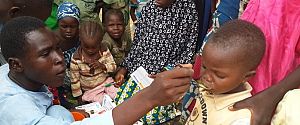
Malaria Consortium's seasonal malaria chemoprevention projects in Africa
7 August 2014In the Sahel region of Africa, which covers a broad swathe of land south of the Sahara, malaria remains the leading cause of severe illness and death in young children. A high proportion of the malaria infections in this region ta…
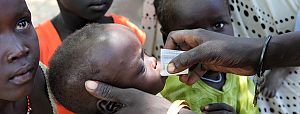
South Sudan faces growing public health crisis
9 July 2014On the third anniversary of South Sudan’s independence, the humanitarian situation remains critical for the country and it is on the brink of famine and facing a public health crisis.
The UN secretary-general, Ban Ki-moon&r…
